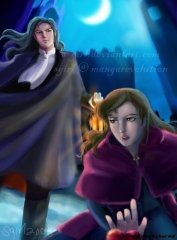As a child, she had heard stories of elves who lived in the woods. She had once asked her mother what they looked like.
“They are remarkably tall, handsome, and proud,” her mama had answered. “They do not like people much either. Should you ever come across one while up in the north, be on your best behavior lest they bind you up with one of their little spells and leave you tied up in a tree branch somewhere for your grandfather to hunt down.”
In spite of the nature of the warning, she recalled that her mother neither liked nor disliked the elves. She had said they were neither good nor evil but simply different from humans, particularly in how they dealt with other creatures.
The man narrowed his eyes further and she came to realized she had been staring too long. She averted her eyes, pushing that childhood memory away and attempting to call more productive thoughts into mind.
That man was no elf, she was certain. Elves, according to the tales, had pointed ears. If they did really exist, they would rather ignore people than dwell near a human town.
The young lady continued to sit uncomfortably in the snow. There was a saying in the south that the north was not much for trust or honesty. To those from the outside, Northlanders were generally more suspicious and wary of all persons, even to one another. Kindness was not a commodity to be taken for granted in these parts. Still—
“Why are you here,” the man repeated, a bit less sternly.
She gathered her wits about her. There would be an easy way to resolve his suspicions towards her. In that case, she was not afraid to admit her fear. “I do not mean to disturb you, sir. But I am a stranger in these parts and there is something following me on the road that apparently killed a pack of wild dogs or wolves near the bridge.”
The man shifted slightly at the mention of the animals. He directed his attention away from her and to the gate.
She continued meekly, “I only wished to stop here for a short while.”
The man looked back at her for a moment, before adjusting his cloak about him. She could tell he did not rather like her intrusion, but he was certain to see the truth of her reasons why shortly. “If you might aide me and perhaps allow me the use of a lantern—”
He frowned at the mention of a lantern, but returned his attention to the gate. “Wait here,” he ordered before turning quickly up the path towards the gate.
She waited, of course, as she had rather not follow him back to the gate. Instead, she reordered her basket and stood to dust the snow from her skirts. She watched as he bounded back up the path. For a moment, she saw him pause to open the gate before he quickly disappeared outside, with his lantern still aloft.
They both stood looking out into the darkness, as the snow continued to fall gently to the earth.
He stood, standing with the light, just outside the gate.
She stood, the snow slowly collecting on the hood of her cloak.
They both watched—his mind calm and hers full of regret for listening to the people in the town.
The sudden metallic clang of a shutting gate interrupted her silent vigil. The girl squinted and observed the man locking and barring the gate. He placed something there before he came quickly back her way. “There is a large shadow at the bridge,” he muttered to her as he drew close. “That shadow or thing should not even be there with the moonlight, but it seems to be trying its best to move beyond that point.”
He lowered the lantern to look at her again, this time, more carefully.
With the light out of her eyes, she was able to observe the grim smile that extended over his face. “Travelers like you,” he stated, “do not often become meals for the shadows but I believe it to be best not to test that belief, Miss—”
“Elanore,” she supplied the name that she thought he was searching for. “Elanore Redley.”
“Ah,” his features reassorted themselves into a more neutral expression as he contemplated her name. “Well, Ms. Redley, I do not mean to dawdle here for pleasantries, but Southerners seem rather attached to their names. As you have come to seek me out, you should know whose property you have encroached upon.”
The look he gave her was not quite a glare but a proud and irritable one.
She bowed politely, acknowledging the man. “I thank you for your kindness, Sir—”
His mouth settled into a grim line. “I am Count Maximilian Wolfram. I own all the land that you have walked through up to this point and up to the nearest town. Only the road and bridge, I do not own,” he stated matter of fact. “Those can never be owned by any one person in this land. It is not permitted.”
She did not know why or ask why. His tone of voice did not permit questions.
The Count continued. “Given that the shadows on that road are behaving most erratically and there is nowhere else for you to go, at this time it is best if you follow me, Ms. Redley.”
With that last declaration he turned his back on her and strode away.

Next

